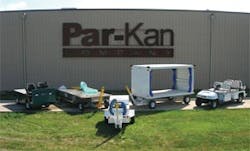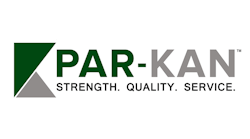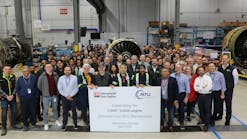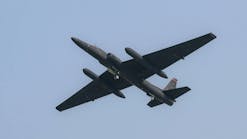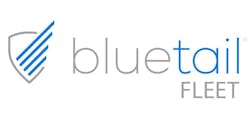With a range of products catering to several industries, Par-Kan Company has continued to pursue opportunities in GSE while relying on its diversified operations to maintain steady financial footing during uncertain times.
A History of Diversification
The company was founded in 1958 by S.L. Parker under the name Parker Industries, producing steel wagons for the hauling of grain in the agricultural market. By the 1970s, the company also began manufacturing refuse containers.
Parker Industries underwent two separate acquisitions by investment groups over the next two decades. The business was closed for a short time in October of 1990 before the founder’s son, Stephen Parker, and a group of investors resumed operations as the Par-Kan Company in November 1990.
Along with manufacturing its line of refuse containers, Par-Kan reached out into the GSE industry in 1992. That expansion was coupled with a foray into the manufacturing of grease handling containers.
In 1996, the company resumed its manufacturing of products for the agricultural industry with weigh carts for grain. Within the past two years, the company has added yet another product line to its operations: electric utility carts.
Though it has maintained a solid stance in additional industries, the Indiana-based company has grown its aviation segment with GSE constituting the largest percentage of its sales.
Riding the Tide
“We’ve probably doubled our sales in the last five years in the GSE industry,” says Todd Sheets, vice president of sales at Par-Kan Company.
Manufacturing a list composed mostly of towable GSE, including baggage carts, fuel service carts, potable water carts and lav carts, Sheets says the company’s success can be largely attributed to its customer service. “We’re willing to take our base model or our standard product line and even a top-of-the-line bag cart and if someone wants to do something a little different with it, we’re willing to customize it — on a minimum order even, to satisfy the customer,” he says.
According to Sheets, the company has catered to most major airlines and ground handling companies with sales predominantly in North America.
Yet, the cyclical nature of the industry has challenged the company, as it has many other suppliers, to maintain strong financial growth.
“We are certainly in a downtrend now with the price of fuel, but we’ve got some good customers that are well established.” Sheets says. “We’ve got some long-term contracts with some of our GSE customers, so the challenge is that right now it’s a challenge for the airlines. So when it comes to spending money, they’re not always going to do that when it comes to towable ramp equipment.”
Looking to the FBO market
That hurdle has prompted the company to turn its focus to an uncharted market — FBOs.
“We’ve just not focused there in the past and we’re always looking at ways to grow sales and since we haven’t been there, that may be a way to expand,” Sheets says.
The company, which will attend the NBAA show in October to further assess market potential, has anticipated that a successful launch will require customization of some of its GSE. “We’re used to building bag carts for the major airlines, so it will be perhaps downsizing some equipment but we’re a manufacturer so it’s certainly not a problem to do that,” he says.
As well, Sheets says, the company’s line of electric utility vehicles might be of use within the FBO market.
Also on the alternative-fuel front, Par-Kan has been manufacturing an electric water truck and lav truck. Having seen an increase in sales of these products, Sheets says the company has considered increasing the products’ capacity from 300 gallons to 450 gallons each to service larger aircraft.
Though the company has continued to focus on developing sales of its GSE, Sheets says, its presence in additional industries has been key to financial balance. “We’re thankful that we’re diversified enough for the ups and downs of all the industries,” he says.
